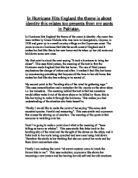
This is a preview of the whole essay
Peer Reviews
Here's what a star student thought of this essay
Quality of writing
The Quality of Written Communication is fair. Whilst there are few/no moments where the intention and meaning behind a sentence is compromised by a lack of standard form, the candidate must adhere to what is required of a GCSE English student. Writing the poems' names in shorthand - or anything in shorthand - unacceptable. Other than that, the grammar here is very good and there is a wide range of correctly-spelt terminology, showing a good knowledge of the appropriate lexes required for English analysis.
Level of analysis
The Level of Analysis shows by this candidate indicates someone operating at a high B grade who could also achieve an A grade if they managed to make their answer clearer and improved their writing standards ("Presents" and "LAL" are not appropriate substitutes for the titles of the poems). It is important that candidate address the poems by their full names and the poets by their surname (Walcott or Alvi, in this case). A number of detailed analytical points have been made, regarding the language used in the poems; there is also a good analysis of the poets' use of structure, but after that the analysis becomes vague. It's definitely there, but the extent to which it shows us anything we don't already see just by looking and reading the poem is debatable. The attention given to how Walcott uses Second Person address and, in comparison, Alvi uses First Person address is good, as it shows understanding that 'Love After Love' was written for the poet and as a guide to others and that 'Presents From My Aunts In Pakistan' is a more personal "autobiographical" account of personal frustration. However, there could be more emphasis on the context of the poems and the varying cultures that conflicted Alvi particularly, as this shows a contextual appreciation that can be hard to integrate in poetic analysis, but it certainly separate the A grades students from the A* grade students.
Response to question
This question focuses around the importance of self-discovery and awareness of self in Derek Walcott's 'Love After Love' and 'Presents From My Aunts In Pakistan' by Moniza Alvi. The candidate here shows a very well-informed knowledge of both poems, and this helps them focus not only on the poetic and linguistic devices used by the poets the generate their poems, but also the effect on the reader, and them as a recipient of the poems' message. Personal account shouldn't be considered the most important aspect of a question like this - it is an analysis after all and by nature requires objectivity, but if candidates find the time and correct circumstances to use it, and if it's done well i.e. - makes some analytical observations and comments about the effect on the reader - then it can only fortify an answer.







